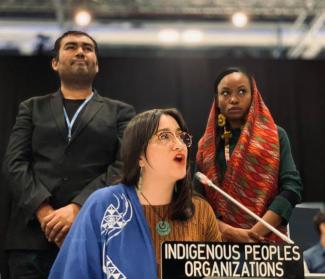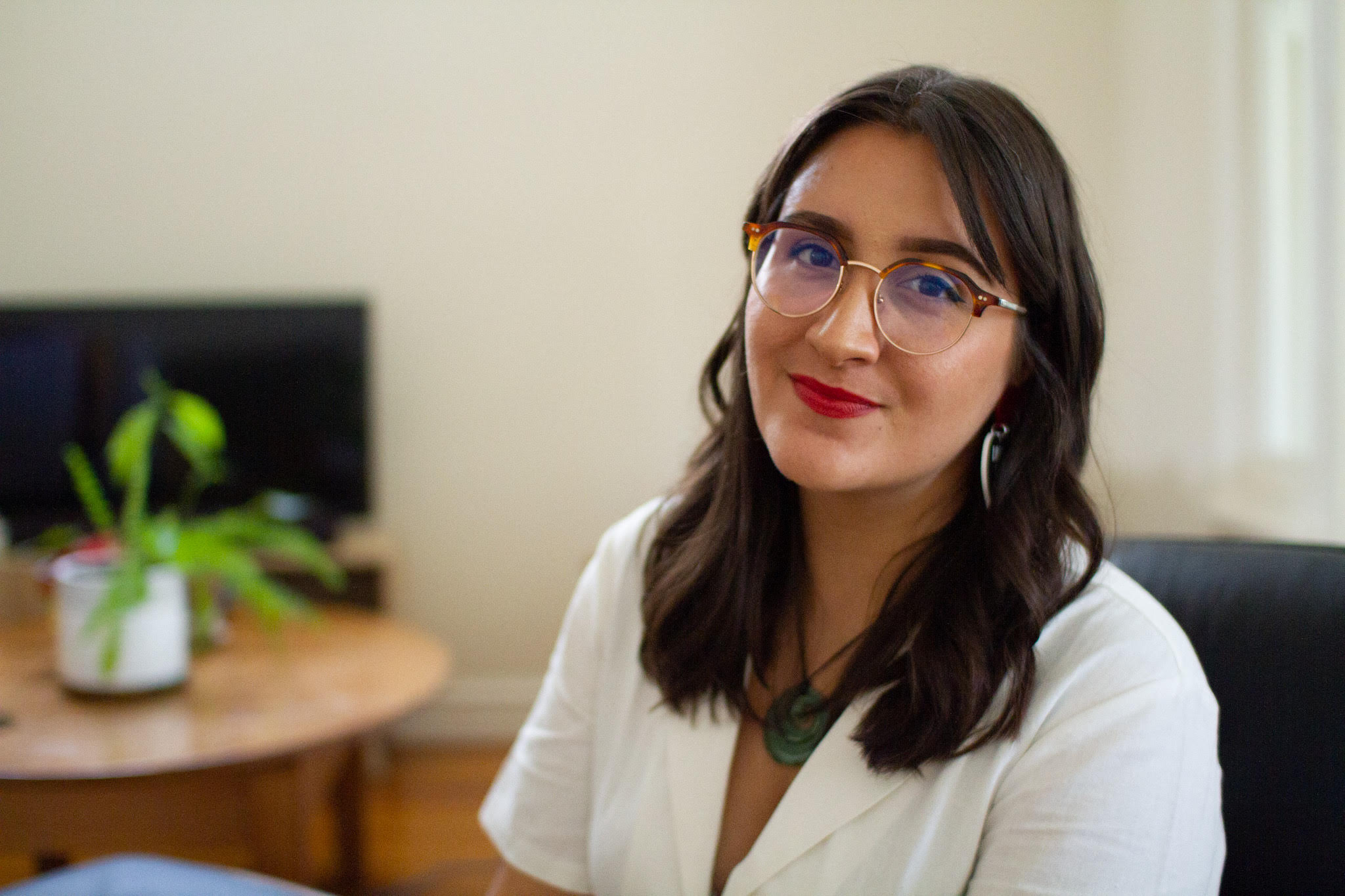
Kera Sherwood-O’Regan (Māori) is from Te Waipounamu, the South Island of Aotearoa (New Zealand). She is the communications and engagement director at Activate Agency, a social impact creative agency that she co-runs with her partner. She works with nonprofits, community organizations, and activists, helping to center voices and stories of structurally oppressed Peoples for social change. Her work focuses on bridging Indigenous Peoples’ rights, the rights of people with disabilities, and climate change and health. While in medical school, she grew passionate about issues of inequity in Indigenous health and how Indigenous communities around the world are affected by health inequities and climate change. Shaldon Ferris (Khoisan), Cultural Survival Indigenous Rights Radio producer, recently interviewed Sherwood-O’Regan.
Cultural Survival: What does the healthcare system look like for Indigenous Peoples in Aotearoa, and for Indigenous Peoples with disabilities?
Kera Sherwood-O’Regan: We see that there are pretty huge disparities in care that Indigenous people get. Indigenous Peoples suffer from higher rates of lung cancer, diabetes, and cardiovascular issues. Some or our people also have a distrust of the health system. If you go to a general practitioner and are sharing some of your experience in just 15 minutes, you cannot build a very good relationship. Maybe there are dynamics that keep you from being open. Oftentimes there is active discrimination. There’s quite a bit of research that shows that general practitioners on average spend less time with their patients who are Māori or Pacific. They also tend to explain things less because there is this inherent assumption that Indigenous people don’t really have good health literacy, which, while it has some truth to it, is because our people have been left out intentionally by a lot of these systems. A lot of doctors will just assume that you don’t know what’s happening and they won’t bother trying to explain things to you, which obviously makes it very difficult to have informed consent in options that you might be provided with. For people with disabilities, medical ableism goes on. New Zealand in particular doesn’t have a very good understanding of ableism and how that operates.
Many Indigenous people also look to different healthcare providers to have more continuity of care. The general practitioner who diagnosed me with my fibromyalgia, a chronic pain condition, was really good. She was Māori. She referred me to rheumatologists and specialists, and was also supportive with me taking an herbal remedy to ease stress, anxiety, or sleep issues, and trying things like acupuncture and physio. In Māori culture, we have mirimiri, a type of healing massage that was really helpful for me. There are many general practitioners who just don’t have any understanding of the different dynamics for our people and are really dismissive of a lot about rongoā, or other sorts of traditional and herbal medicines. In my experience, Traditional medicine in New Zealand has not been very well integrated.

CS: What impact is climate change having on health in your community?
KSO: When we’re talking about direct effects of climate change on health, we’re often thinking about things like a climate disaster. If there are floods, fires, or coastal erosion and people are injured, disabled people are left behind in those sorts of disaster responses—whether they’re not being rescued, whether the government plans and responses are accessible for disabled people and for Indigenous people, or whether those communities are even getting essential information. If that’s not occurring in a language that you’re comfortable with, or over communications that you’re comfortable with; if you’re d/Deaf and you can’t hear sirens or warnings, or if you’re blind or have low vision and you’re not getting all of that same input that’s prioritized towards people who are visual receivers of information, that can leave a lot of people behind.
As the temperature rises, obviously that has some direct effects in terms of people’s health. Heat stroke is a really big thing, particularly for a lot of our elders, and it can also contribute to other health conditions, like my fibromyalgia migraines. We also have direct effects that come from pathogens like viruses and bacteria that cause disease, and sometimes longer term disabilities, as well as the vectors that carry them. Those vectors might be things like ticks or mosquitoes. As the climate is changing, the patterns of those pathogens and vectors are moving.
A big thing for Indigenous communities is also thinking about a lot of the indirect effects of climate change, like ecoanxiety. It affects a lot of people, but particularly Indigenous communities. We are losing our homes, but we are also losing sites that are very spiritually or culturally significant, like our urupā, or cemeteries. That is a huge amount of trauma that our people have to experience. Many island communities are also threatened with rising sea levels, and having to go to different countries and leave your cultural, historical, and traditional home is a hugely traumatic process.
CS: What are some successes you have seen in the context of Indigenous and disability rights?
KSO: One of the things that’s been really important is the solidarity between Indigenous and disabled groups at the United Nations climate negotiations. I’ve been involved in an organization that my partner founded called SustainedAbility, which is a network of disabled people advocating for disability rights in the context of climate change. One of our core asks at the United Nations Framework Convention on Climate Change is to establish a constituency for disabled people, because that’s currently not in existence. The Indigenous Peoples Caucus and International Indigenous Peoples Forum on Climate Change have been hugely supportive of the calls to action for disabled people to have some space in those negotiations as well. They have also echoed a lot of our calls for language that respects disability rights as well as Indigenous rights, and have supported our disabled Indigenous members to have a voice in these spaces. That shows the strength of our community and the strength of the Indigenous and the disabled rights movements—how we’re actually the voices who most need to be in the room, and we’re the ones giving space and ensuring everyone who needs to be in the room is right there alongside us.
CS: What does the future of Indigenous health look like in your community?
KSO: I used to put a lot of emphasis on changing the system from within. I bought into that vision of being a Māori doctor, that at some point I would have some power to effect change. I’ve come to realize how that system is set up to protect itself. There are so many barriers that make it difficult for people who have different experiences, whether that’s being disabled or Indigenous or queer or from the global south or having English as a second language. There are so many different ways that that system is set up to continue to privilege cis heterosexual able bodied white men, essentially.
I think that buying into that idea of system change having to happen from within actually harmed me a lot as a disabled and as an Indigenous person in medical school. I experienced a lot of trauma. Nowadays I’m thinking much more around how I can change the system from the outside. I take my hat off to my colleagues from medical school who are active and find ways to deal with institutionalized racism, ableism, and oppression. Often these systems are set up to replicate themselves. If we can get outside of these systems and be active and try to challenge and change the underlying roots of those issues, then that’s really powerful.
The future for the health of our communities is recognizing that we don’t always have to buy into these systems that harm us. We can have our own thing. So I think the future of Indigenous health is tied inherently to our sovereignty: sovereignty in terms of our land, our stories and narratives, our bodies. As an Indigenous woman and also as a disabled person, I’m constantly taught that my body isn’t right. The whole health system is about “fixing” our bodies and legitimizing other people dictating how our bodies should be, or how they should change, or how they should perform. That’s trying to justify essentially acts of violence on our bodies. So I think sovereignty in all forms is essential for our future health and well being.
If our hapu, iwi, whānau, or our Tribes and families, were able to uphold their sovereignty as they were meant to be under the Te Tiriti o Waitangi, one of our founding documents, that would make all the difference in terms of our health. Because instead of trying to change the system that’s fundamentally not made for us, we could actually start to imagine something completely different. I don’t envision that would be a health system that’s separate from an education system or a justice system or from anything else. I see that when our sovereignty is recognized, we can focus on our whole communities and we can change those structures so that well being is embedded across it all. Something I found really valuable as a resource is the Matike Mai Report, which was about constitutional transformation. It suggests what governance and real partnership and power sharing could look like in New Zealand. That’s a really exciting model that I think can assure us of our sovereignty, and that could have a huge effect on our well being.
CS: How has the Indigenous community in Aotearoa been responding to COVID-19? How are disability rights being addressed?
KSO: Indigenous and disabled communities have been doing a lot of work. I’ve mostly been engaging with other disabled groups. A number of iwi and hapū are taking this moment to exercise their sovereignty by setting up roadblocks. We’re seeing that a lot of privileged people are thinking that lockdown is a great time to go to rural communities, to beaches, or holiday homes where they are increasing the risk for our rural Indigenous communities. Our Indigenous people are setting up roadblocks and turning cars away and making sure that people can’t get through, which I think is a really powerful way for them to assert their sovereignty and role in protecting our people. Communities are also organizing and checking in with those most at risk. My Tribe, Kāi Tahu, have been calling our elders, making sure that people have what they need. In our disabled community as well, people are sharing food parcels to make sure those who are high risk for COVID-19 like myself, don’t need to go out shopping and put ourselves at risk. I see that happening in the Indigenous and disabled communities the most, that there is this real vibe of collective care and that we’re going to make sure that we all get through.
Top photo: Freddy Sébastian Medina, Kera Sherwood-O'Regan (center), and Hindou Oumarou Ibrahim advocating on behalf of Indigenous Peoples' organizations at COP25 in Madrid, Spain. Photo by Jason Boberg.
